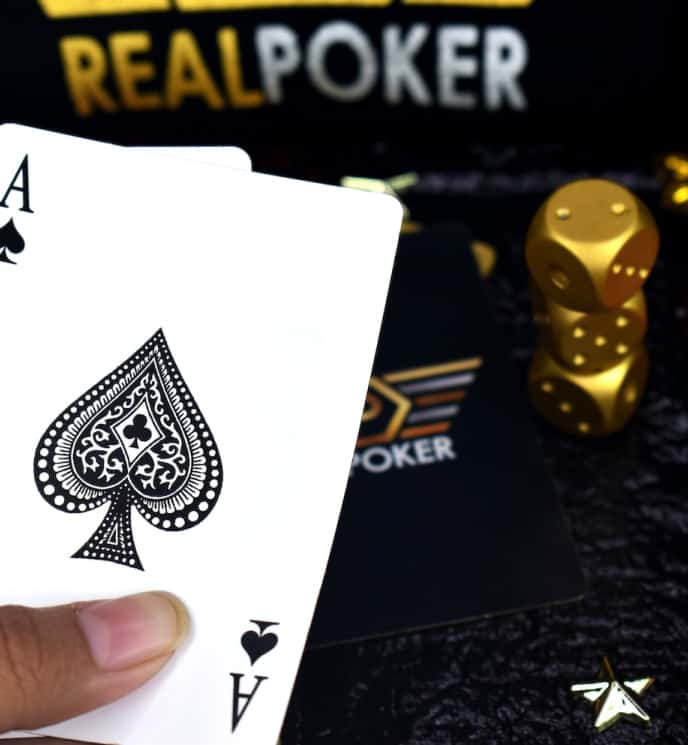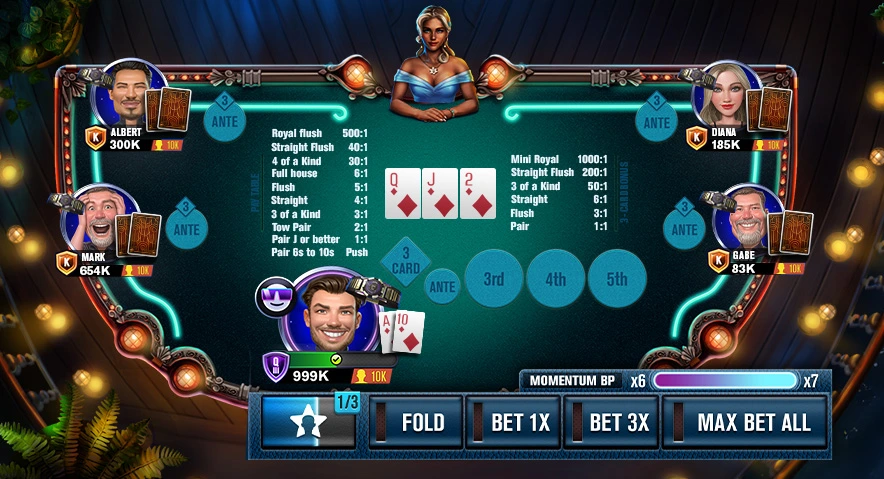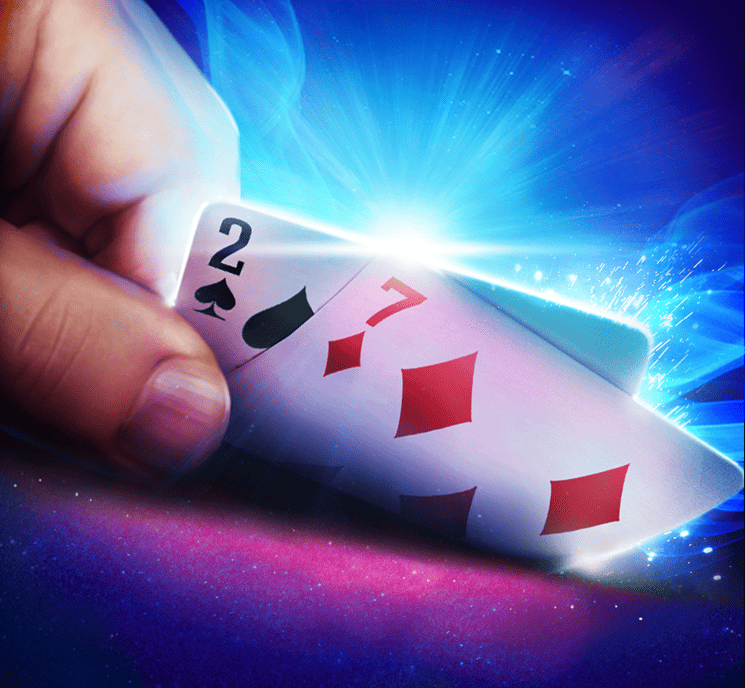Objective of Poker
Poker is incredibly enjoyable. As well as being mentally stimulating, itвҖҷs incredibly social. Therefore, your main objective is to have fun. Regardless of how skilled you are, and whether youвҖҷre winning or losing, donвҖҷt forget to enjoy yourself.ThatвҖҷs the reason we all play. Sure, itвҖҷs nice to win a few pots, but that shouldn’t be the only reason you ante up. If you can remember this, youвҖҷll get more out of the game. YouвҖҷll also be more willing to learn the basics of poker and become a better player.
Other than having fun, your main objective in poker is to win more chips than you lose. You donвҖҷt need to win as many pots as possible. In fact, you donвҖҷt even need to win more pots than you lose. All you want is to have more chips at the end of play than you had at the start.
This objective applies to cash games and tournaments, both of which have secondary objectives:
How to Play Poker Cash Games
Cash games donвҖҷt have start and end points. You buy in for any amount of money thatвҖҷs between the tableвҖҷs minimum and maximum limits.
Each chip has a 1:1 cash value, which means a $1 chip is worth $1. You can play for as long as you like, but the overarching aim is to make a profit.
How to Play Poker Tournaments
Poker tournaments have entry fees and set starting points. That means everyone pays the buy-in before registration closes.
Everyone who enters gets a stack of chips that only has value inside the tournament. In other words, you canвҖҷt exchange tournament chips for cash. Instead, chips are your lifeline.
They keep you alive in the tournament, and once you lose them, youвҖҷre out. Therefore, the goal in poker tournaments is to protect your stack while winning chips from other people.
Doing this allows you to outlast other players. When you outlast enough players, you вҖңmake it into the money,вҖқ which means you get a return on your investment. The longer you survive, the more prize money you win.
To recap what weвҖҷve said so far, the objective of poker is to win more chips than you lose. In cash games, this means leaving the table with more money than you started with. In tournaments, this means outlasting everyone else by protecting your stack while winning chips.
Poker Basics: How to Win Pots
The question youвҖҷre probably asking now is, how do I win pots? ThatвҖҷs a complex question to answer because it requires an understanding of poker rules and poker strategies. However, when you strip everything back, there are two ways to win pots:
- By having the best-ranked hand at a showdown.
- By betting in such a way that everyone else folds their hand (aka you win the pot uncontested).
ThereвҖҷs an element of skill and luck in both scenarios. For example, you could be playing HoldвҖҷem, move all-in preflop with pocket aces, and get someone to call with 5вҷҘ 6вҷЈ.
Put that hand into a poker calculator, and youвҖҷll see that pocket aces have an 80% chance of winning. Despite being a heavy favorite, aces arenвҖҷt guaranteed to win. ThatвҖҷs where luck comes into poker.
You can only master poker if you accept that skill and luck are both part of the game.
Poker Basics: Cards, Formats, and Bets
Now you know the aim of poker, letвҖҷs look at how to set up a game. Although there are differences between variants, the main poker rules you need to know are:
- Number of decks used in poker = 1
- Number of cards used in poker = 52
- Number of players in a game = 2 to 9
Poker Table Set-Up
Once youвҖҷve got some cards and players, you need something to get the game started. The way you do that is through forced bets known as blinds and antes.
Blinds
Two players put in forced bets known as blinds before any cards are dealt. There is a small blind and a big blind.
The former costs 50% of the latter, e.g., $1 small blind and a $2 big blind. Finally, the blinds move clockwise around the table, and the dealer button follows them.
The blind system is used for these poker variants:
- Texas HoldвҖҷem
- Omaha
- 5-Card Draw
- 2-7 Triple Draw
Antes
The second set of poker rules covering forced bets involves antes. Like blinds, antes are forced bets that must be paid before any cards are dealt.
However, instead of two players posting forced bets, everyone pays the ante. The antes are followed by the вҖңbring-in,вҖқ which is a secondary forced bet paid by a single player.
These poker rules are used for Stud variants, including 7-Card Stud, 7-Card Stud Hi/Lo, and Razz.
Formats and Betting Structures
The final parts of a poker game you need to know are the format and betting structure. There are three main formats in poker:
- Cash games
- Tournaments
- Sit & go tournaments (aka on-demand tournaments)
You need to use different poker strategies in each format to be successful. But as we said earlier, the overall objective in all types of poker is to win more chips than you lose.
One of three betting structures can be used for cash games, tournaments, and SNGs:
- Limit = the amount you can bet or raise is limited to the value of the blinds/table stakes.
- Pot Limit = the amount you can bet or raise is limited to the value of the pot.
- No Limit = there are no restrictions on the amount you can bet or raise, i.e., you can bet your entire stack.
Those are the poker basics you need to know if youвҖҷre going to play any type of poker. Of course, learning how to play poker doesnвҖҷt mean youвҖҷre going to win.
For that, you need the ranking of hands, how to make bets, and the moves skilled players make. LetвҖҷs tackle each of these things in turn, starting with the ranking of poker hands.
Poker Hand Rankings
Go back to the start of this guide on how to play poker for beginners, and youвҖҷll recall that we said you can win pots in two ways. If you donвҖҷt make everyone else fold, a showdown takes place.
A showdown compares the active hands, and the best one wins the pot. In this context, best means the highest-ranking hand according to the table below:
| Rank | Hand | Example |
| 1 | Royal Flush | AвҷҰ KвҷҰ QвҷҰ JвҷҰ 10вҷҰ |
| 2 | Straight Flush | 4вҷҘ 5вҷҘ 6вҷҘ 7вҷҘ 8вҷҘ |
| 3 | Four of a Kind (quads) | KвҷҰВ KвҷҘ Kвҷ KвҷЈ 10вҷ |
| 4 | Full House (full boat) | Aвҷ AвҷҘ QвҷҰ QвҷҘ QвҷЈ |
| 5 | Flush | 6вҷҘ 8вҷҘ 10вҷҘ 2вҷҘ JвҷҘ |
| 6 | Straight | 6вҷ 7вҷЈ 8вҷҘ 9вҷҘ 10вҷҰ |
| 7 | Three of a KindВ (set/trips) | Jвҷ JвҷЈ JвҷҰ 6вҷҘ 8вҷЈ |
| 8 | Two Pair | 7вҷ 7вҷҘ 10вҷЈ 10вҷҰ AвҷЈ |
| 9 | One Pair | AвҷЈ AвҷҘ 7вҷ 3вҷҘ 10вҷҰ |
| 10 | High Card | AвҷЈ 8вҷ 3вҷҘ 7вҷҘ Jвҷ |
There are two caveats when it comes to poker hand rankings. The first is split pots. When two or more players have a hand of equal value, the pot is split evenly between them.
The second caveat is lowball games. Poker variants such as Razz use a different ranking system that puts hands with low-value cards above hands with high-value cards.
We donвҖҷt have time to cover the nuances of lowball poker variants, other than to say they involve a modified ranking system. That being said, the majority of poker variants, including HoldвҖҷem and Omaha, use the standard hand ranking system shown in the table above.
If youвҖҷre new to poker and want to make your life easier, check out our downloadable poker hand ranking chart. ThereвҖҷs nothing wrong with referring to a hand ranking chart while youвҖҷre playing, so print it and keep it with you while youвҖҷre learning the basics.
Betting Options and Terminology
- Poker hands are broken down into betting rounds, also known as streets. We already know that the way you bet is dictated by one of three structures: Limit, Pot Limit, and No Limit.Within these formats, standard poker rules dictate that you can make one of five moves:
- Check = you pass the action along to the next player without putting chips into the pot.
- Bet = youвҖҷre the first player to put money (aka chips) into the pot.
- Call = you match the last biggest bet.
- Raise = you add more chips on top of the last biggest bet, i.e., you raise its value.
- Fold = you decline to call the last biggest and give up your cards.
ItвҖҷs important to understand that some of the options listed above might not be available. ThatвҖҷs because the fundamental principle in poker is that you must match or beat the last biggest bet to remain active in the hand.
For example, if the player to your left bets $10, you need to match that amount (by calling) if you want to stay in the hand.
The only time you wonвҖҷt need to put chips into the pot is if there hasnвҖҷt been a preceding bet. In this situation, itвҖҷs possible to check. However, if there has been a prior bet, you canвҖҷt check.
Common Poker Variations
WeвҖҷre showing you how to play poker from a general perspective, but each variant has its own rules.
The good news is that weвҖҷve got guides for Texas HoldвҖҷem, Omaha, and 3-Card Poker, so check those out if you want to learn more.
For this guide, hereвҖҷs a quick overview of the most popular poker variants:
| Poker Variant | Main Features |
| Texas HoldвҖҷem | Community card variant in which you have two hole cards. |
| Omaha | Community card variant in which you have four hole cards. |
| 7-Card Stud | A non-community card variant in which you receive up to seven hole cards. |
| 5-Card Draw | A non-community card variant in which you receive five hole cards with the option to exchange them. |
| H.O.R.S.E | A mixed game that includes five variants: Hold’em, Omaha Hi/Lo, Razz, 7-Card Stud, and 7-Card Stud Hi/Lo |
The Basic Rules of Poker: How to Play Texas HoldвҖҷem
ItвҖҷs at this point that we need to take all the poker rules weвҖҷve talked about and put them into an example.
For ease and because itвҖҷs the most-played variant, weвҖҷll use Texas HoldвҖҷem for this example:
Table Set-Up
- Format: Cash game
- Betting Structure: No Limit
- Number of Players: 6
- Stakes: $2/$4
The Blinds and Button
- Player 1 posts the $4 big blind
- Player 2
- Player 3
- Player 4
- Player 5 has the button
- Player 6 posts the $2 small blind
Pre-Flop Betting Round
- Player 2 acts first and folds
- Player 3 folds
- Player 4 raises to $12 with AвҷҰ JвҷЈ
- Player 5 folds
- Player 6 folds
- Player 1 calls with KвҷҘ QвҷҘ
The Flop Betting Round
The flop: KвҷЈ 10вҷ 4вҷҘ
- Player 1 acts first and bets $16
- Player 4 calls
The Turn Betting Round
The Flop + Turn Card: KвҷЈ 10вҷ 4вҷҘ QвҷҰ
- Player 1 checks
- Player 4 bets $30
- Player 1 calls
The River Betting Round
The Flop + Turn + River Card: KвҷЈ 10вҷ 4вҷҘ QвҷҰ 2вҷЈ
- Player 1 checks
- Player 4 bets $65
- Player 1 calls
Showdown
- Player 1 has two pair: KвҷҘ QвҷҘ KвҷЈ QвҷҰ 10вҷ
- Player 4 has a straight: AвҷҰ KвҷЈ QвҷҰ JвҷЈ10вҷ
Result
- Player 4 wins with a straight
Table Talk: How to Act in Live Poker Games
Online poker is great because you can tap a button to call, bet, fold, check, and raise. In the real world, you donвҖҷt need to make your intentions clear. You do that through a combination of physical gestures and words.
Now, itвҖҷs important to note that you donвҖҷt have to speak. Some people prefer not to because theyвҖҷre concerned it might give away the strength of their hand.
However, itвҖҷs often a good idea to say what you intend to do when youвҖҷre a novice. This avoids any confusion and prevents you from making costly mistakes.
The main actions you need to use in live poker games are:
- Protect your cards, either with your hands or by putting a chip on them, so the dealer knows youвҖҷre still involved in the pot.
- Tap the table when you want to check.
- Push your cards across the line when you want to fold.
- Slide your chips across the line when you want to bet, raise, or call.
- Announce the amount youвҖҷre going to bet or raise. For example, if someone bets $5 and you want to raise $20 to $25, say: вҖңI raise to $25.вҖқ DonвҖҷt say, I call $5 and raise $20.
- Put the required number of chips into the pot using a single motion. For example, if you want to raise $20, itвҖҷs best to count out $20 and put it into a small stack. After that, announce вҖңI raise $20вҖқ and push your chips across the line.
You can stop announcing your bets and raises as you become more confident. However, at least initially, we recommend verbalizing everything you do.
Key Poker Strategies for Beginners
- Learning how to play poker is the first step in your quest to become a winning player. The next step is to master the poker strategies used by pros.ThereвҖҷs an almost infinite amount of poker strategy to learn, so we canвҖҷt cover everything. What we can do, however, is give you five fundamental skills that can help you scoop more pots:
1. Learn to Read
Reading in poker doesnвҖҷt mean deciphering words and letters. It means reading the game in terms of who is betting, the amounts theyвҖҷre betting, and the cards theyвҖҷve shown. Essentially, you need to have a вҖңreadвҖқ on the game and its players so you can make better decisions.
2. Exploit Common Traits
Observing people and getting reads allows you to identify common traits. For example, you might notice that a particular player always raises when they have the button. You can exploit this trait.
LetвҖҷs say youвҖҷre dealt pocket aces and the player youвҖҷve got a read on has the button. Instead of raising as you usually would, you decide to call.
The reason for calling is that you expect the player on the button to raise. If they raise, it gives you a chance to get more money into the pot by re-raising. ThatвҖҷs how you can exploit your opponentвҖҷs common traits.
3. DonвҖҷt Bet Blindly
The amount you bet matters, particularly in Pot Limit and No Limit games. There are three things to consider when you bet or raise:
- Do you want people to call or fold?
- How many chips are in the pot?
- How many chips does your opponent have?
These three factors determine the amount you bet. For example, people only fold when you put enough pressure on them.
The best way to do this is to bet an amount thatвҖҷs equal to the size of the pot and/or your opponentвҖҷs stack. This puts pressure on your opponent because it will cost them many chips if they make the wrong decision.
4. Position is Your Friend
Playing вҖңin positionвҖқ is easier than playing вҖңout of position.вҖқ Being вҖңin positionвҖқ means youвҖҷre close to the button and get to act after other people. The benefit of acting after other people means youвҖҷve got more information.
You can make better decisions with more information. ThatвҖҷs why you should aim to play the majority of hands in position. WeвҖҷre not saying you should play every hand youвҖҷre dealt. ItвҖҷs more the case that playing in position gives you an advantage.
5. DonвҖҷt Burn Your Stake
Our final poker tip relates to responsible gambling. Otherwise known as bankroll management, this skill prevents you from risking more than you can afford to lose because, as weвҖҷve said, poker is a combination of skill and luck.
The general rule for cash games is 20x, which means you should have at least 20 buy-ins for the games you want to play. LetвҖҷs say you want to play $0.50/$1 cash games with a maximum buy-in of $100. You need a bankroll of at least $2,000 to play these games.
For tournaments, itвҖҷs recommended that you have at least 100 buy-ins. If youвҖҷre playing $5 tournaments, you need at least $500. Sticking to these rules will give you the best chance of not burning through your stake.
Bonus Poker Strategy Tip: Player Types and Tells
- Poker strategy is as much about people as the cards youвҖҷre holding. In fact, if you canвҖҷt get reads on your opponents and determine when theyвҖҷre weak or strong, winning pots is almost impossible.The easiest way to get reads on your opponents is to categorize them according to their playing style. There are five main player types:
- Rock = These people donвҖҷt play many hands and tend to be passive, i.e., they prefer to check and call rather than bet and raise.
- Tight and Aggressive (TAG) = These people play more hands than a rock, but they mainly stick to premium starting hands. When they decide to play, theyвҖҷll often try to be aggressive, which means betting and raising when they can.
- Loose and Aggressive (LAG) = These people play quite a few hands. TheyвҖҷll play premium starting hands, suited connectors, weak aces, and some bluffing hands. TheyвҖҷll often try to dominate the action by betting and raising.
- Tight and Passive (LAP) = These people play the same hands as a LAG, but they have a passive style, which means they call and check a lot. LAPs are great players to play against because they donвҖҷt put much pressure on you and will chase draws, even when itвҖҷs mathematically incorrect to do so.
- Manic = These players are completely unpredictable. They can bet and raise with any two cards, which makes them hard to read. The best way to play against maniacs is to let them take the betting lead when youвҖҷve got a strong hand.
You have to watch players to categorize them. The traits (aka tells) to look for are:
- The number of hands someone plays, and how often they check/call vs. bet/raise.
- The average size of someoneвҖҷs bets/raises.
- How often does someone play in early position vs. late position?
- The hands someone has at a showdown.
- The time it takes for someone to make decisions. If they usually take 15 seconds to act but raise instantly, itвҖҷs probably a sign theyвҖҷve got a strong hand.
Experienced poker players take all these variables into account so they can get better reads. TheyвҖҷll also adjust their reads if something changes. Indeed, the mark of a skilled poker player is being able to adapt quicker than their opponents.
Poker Basics: Etiquette
An essential but underappreciated part of learning how to play poker is etiquette. Poker is a social game, so it pays to be nice. Treat everyone as you want to be treated. Be polite and do your best to keep up with the action.
This means knowing the gameвҖҷs rules, paying attention, and not taking too long to act. Get these things right, and youвҖҷll have a lot of fun playing poker in any setting.
How to Play Poker FAQ
The best hand in poker is a royal flush. A royal flush is a suited ace-high straight, which means youвҖҷve got A-K-Q-J-10, and all the cards share the same suit. For example, AвҷҘ KвҷҘ QвҷҘ JвҷҘ 10вҷҘ is a royal flush.
Bluffing is when you bet with the worst hand and make everyone else fold. Bluffing is a skill that requires perfect timing and bet sizing. Ideally, you want to bluff against weak players who donвҖҷt appear to have a good hand.
Learning how to play poker is easy in terms of the basics. The aim is to win pots by having the best-ranked hand or by making everyone else fold. You do this by betting and raising. Each poker variant has rules governing how you do this, but the aim is always the same.
No, online poker games at reputable sites are completely fair. We know this because the algorithms that control games are called random number generators (RNGs). Random number generators are tested by third parties to ensure they mimic a fair deal.
The best poker strategy for new players is based on the tight is right principle. This approach requires you to play a tight range, which, in simple terms, means a small selection of starting hands. Your range should consist of the top 10% of starting hands in whatever variant youвҖҷre playing. When you elect to play a hand, try to take the lead by betting and raising.
Learn, Practice, and Play Poker
ThatвҖҷs everything you need to get you started. Poker, at its core, is a game where winning pots matters. However, as you get deeper into it, youвҖҷll realize that there are many different facets to the game.










